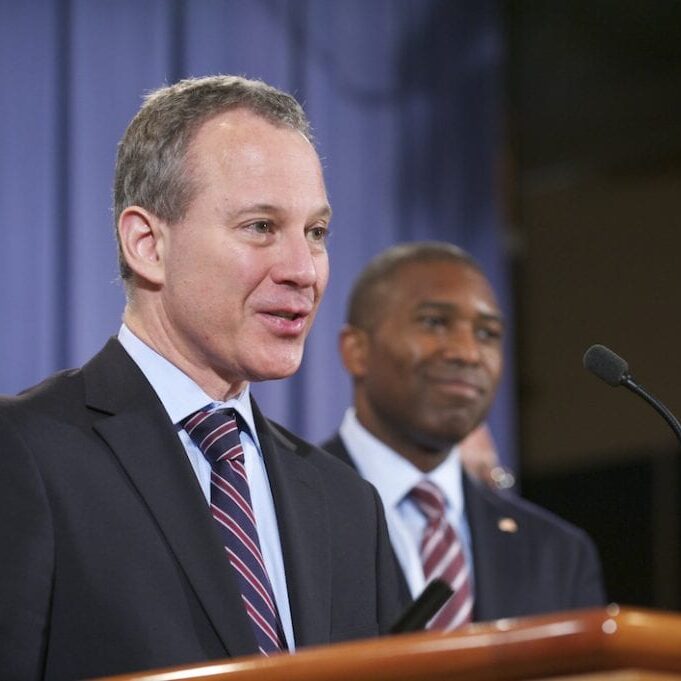Insights < BACK TO ALL INSIGHTS
Eric Schneiderman’s Losing Lineup
Eric Schneiderman’s Losing Lineup
By: Jeff Ifrah
Defenders of DFS like to point out that it is skill-predominant. If the same can be said for public prosecution, then New York Attorney General Eric Schneiderman has been fielding one hell of a losing lineup.
Between the two of them, DraftKings and FanDuel dominated the DFS space, and they still did after Schneiderman dumped near-identical complaints at their doorsteps. But now their well-being was in question. Schneiderman accused them of having committed every wrongdoing under the sun. First, DFS too closely resembled sports betting, and was supposedly evasive about it. Their commercials made winning look too easy, which you can’t do when promoting gambling. Then there’s the DraftKings employee who used inside information to get an edge on FanDuel, prompting NYAG to open an investigation the next day. Finally, DFS seemed to be flouting the gambling statutes of every state in the Union.
Neither DraftKings nor FanDuel took the provocation sitting down. They countersued, leading to intense litigation and casting enormous doubt over the future of DFS, which had hitherto seemed so rosy.
Then the parties agreed to a settlement—or an armistice, if you listen to us. Schneiderman would suspend all prosecution against DraftKings and FanDuel, and would go so far as to drop it altogether—as long as the New York state legislature passed a bill expressly legalizing and regulating DFS later that year. That’s exactly what the legislature did, killing Schneiderman’s case almost completely.
There was one exception: the part of the complaints that concerned “false advertising.” Schneiderman has hung on to it for dear life. No matter what the legislature decided, he said, “our key claims against the companies for false advertising and consumer fraud are not affected by the agreement and will continue.”
Not affected by the agreement? Is Schneiderman reading the same complaints we are? Everything in there about how DraftKings and Fanduel presumably deceived consumers rests entirely on the notion that DraftKings and FanDuel were illegal gambling enterprises—a notion that the legislature has flatly repudiated.
Here is what the complaints specifically claim DraftKings and FanDuel did to deserve to be accused of false advertising:
(a) Misrepresenting that defendant complies with applicable laws;
(b) Misrepresenting that casual player is likely to win a jackpot;
(c) Misrepresenting that DFS is a “skill game”; and
(d) Misrepresenting that defendant’s games are not considered gambling
Let’s begin with (c) and (d), which are almost the same thing, and (a), which is also related. DraftKings and FanDuel supposedly made the mistake of claiming that DFS was a game of skill—therefore not gambling, therefore legal. It seems to me like the New York legislature has just agreed with them. It doesn’t matter that the bill passed months after the fact; if the legislature thought that DFS was gambling, it could not have legalized it without running a constitutional referendum first, which of course it didn’t do. Therefore, the bill’s passage is a retroactive validation of the legality of DFS in New York. So DraftKings and FanDuel misrepresented nothing. The worst you could say is that they were not paying the tax that they now have to pay, but that has nothing to do with whether what they were doing was ever “gambling” under New York law. It wasn’t, plain and simple.
Then there’s (b), which alleges that DraftKings and FanDuel misrepresented the casual player’s likelihood of winning a “jackpot.” Use of that word is unnecessary and almost suspicious. A “jackpot” is typically an outcome of chance-dominant games, like slot machines. Even the “bad beat” jackpots you find in some poker rooms rely on the uncontrollable probability of being dealt certain cards, nothing having to do with skill. Whoever wrote the complaints either knew this but thought better of it, or didn’t know this and thus has no business writing anything about gambling. The complaint could just as easily have said “misrepresenting that a casual player is likely to win” and left it at that, without any damage to the fundamental point. Instead, someone decided to throw in an evocative keyword, as if to reinforce an already dubious comparison to gambling. (Ironically, using gambling parlance out of turn is something DraftKings CEO Jason Robins used to do quite often, and the DraftKings complaint has a field day with it. It is safe to assume he has since stopped. After everything that’s happened, no DFS executives in their right minds would call any giveaway of theirs a “jackpot.”)
I’m not taking the DFS side wholesale. Whether it’s a “jackpot” you’re giving away or just a big bundle of cash, there’s no question that DFS involves a big element of chance; as such, some transparency about the odds is, and was, in order. Insofar as the complaints imply that, I agree with Schneiderman 100%, and the DFS sites would do well to keep that part of the marketing in check from now on.
There is also the matter of consumer protections, which will almost certainly be improved thanks to the passage of the DFS bill. If the complaints were what it took to get us there, then so be it. But that’s all that this case should ever have been about.





